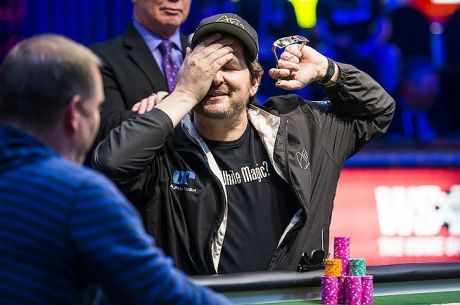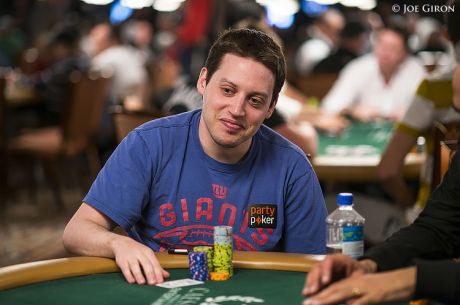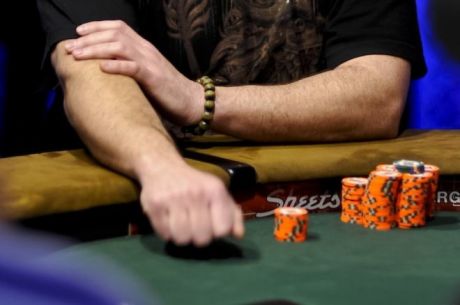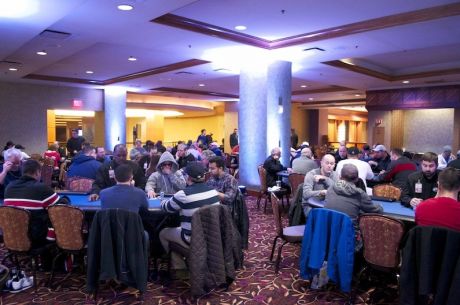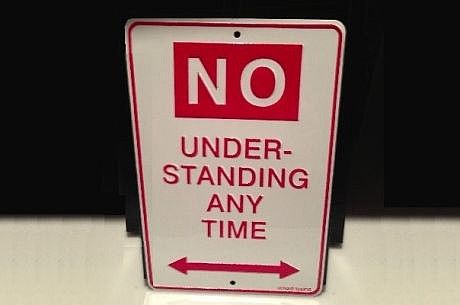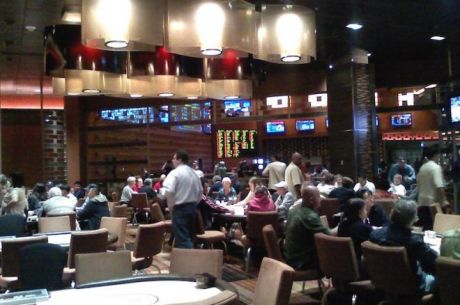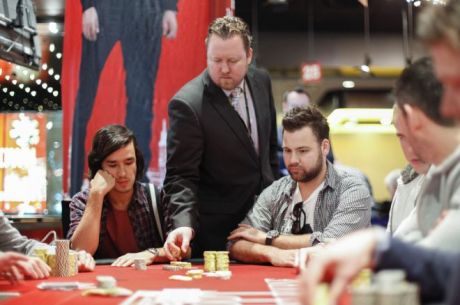Casino Poker for Beginners: Chopping Blinds - Expectations, Etiquette, and EV
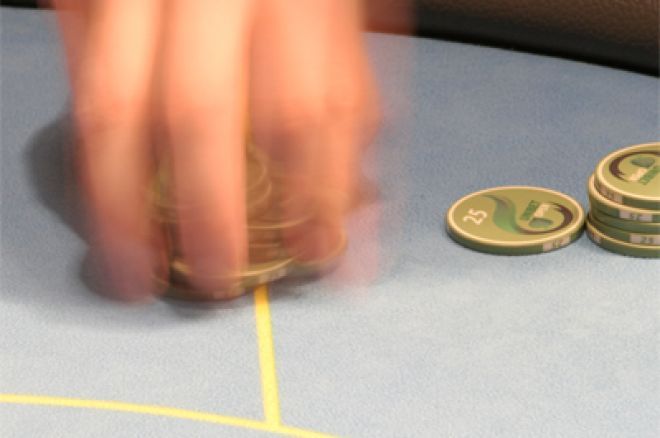
At some point in just about every session of hold��em poker in a casino, you will be faced with this scenario:
You��re in the big blind. The player to your left, first to act, folds. So does the next player, and the next, and so on, including the button. The player in the small blind now turns to you and asks a single word: ��Chop?��
I was among the many, many players who had no idea what was being asked of me the first time this happened. I��d like to fill you in so that you don��t end up as flustered as I was.
��Chopping the blinds�� in cash games is allowed in every casino in which I��ve played poker. It means that when everybody except the two blinds has folded before the flop, the last two players may end the hand right then and there. If both players agree to it, they can take back their blind bets, and the hand ends. The button advances, and the game moves on to the next hand, with nobody having either won or lost a dime. (At least that��s how it works in Las Vegas. I understand that some California cardrooms take a small rake even if the blinds are chopped, which I think is unconscionable.)
So... knowing what the question whether or not you��d like to chop the blinds means, how should you answer it?
To Chop or Not to Chop?
My reaction when I was first presented with this option was to reject it. After all, I came to the casino to play, not to fold. My selfish reasons for wanting to play rather than chop have only become stronger as I have gained poker experience. Playing blind-versus-blind presents difficult tactical and hand-reading challenges, and I have reason to believe that I will, on average, make those tricky decisions better than my opponent, and the situation will therefore be profitable or ��positive EV�� for me.
However, there are also legitimate reasons to favor chopping. Often both players will have nothing in the way of starting hands, and the hand will play out either checked down all the way, or with one bet at some point followed by an immediate fold. Either way, somebody wins a $3 pot in a $1/$2 no-limit hold��em game. Worse, that $3 pot may be reduced by some amount of rake. For such paltry stakes, the whole table is delayed from getting on to the next hand.
But the most important reason to agree to a chop is social. A high percentage of low-stakes players have a strong preference to chop. You do have veto power over that choice, but if you exercise it, you will generate resentment in a lot of opponents. Some significant fraction of them will immediately retaliate by putting in a prohibitively large raise �� sometimes even all in �� regardless of what their cards are, just to ��teach you a lesson.�� It is particularly troublesome to have the player on your left be angry with you, because his positional advantage gives him endless opportunities to punish and confound you for the next several hours.
This part of the game is perhaps hard for new players to understand, but it��s absolutely true. Having friendly relations and good feelings between you and your opponents wins you more money than having hard feelings and resentment. In terms of long-term profit, that factor vastly outweighs the small edge you might have in contesting blind-on-blind pots. Besides, it��s a lot more pleasant to spend the time sitting next to people with whom you��re on good terms than people who are glowering at you, thinking you��re a jerk, and looking for chances to rub your face in a big loss.
Your Chopping Choice
��Okay,�� you think. ��That sounds reasonable, and I��ll agree to chop the blinds if the other guy does �� at least most of the time. But surely not when I��ve finally been dealt the pocket aces or kings that I��ve been waiting for!��
Sorry, but that��s not how it works. With any given adjacent player, you need to either always chop, or never chop. Doing it selectively is both socially wrong and strategically disastrous.
Since you have veto power over the chop, would you passively allow your opponent to decide to chop most hands, but play his very strongest ones? Of course not. That would be to voluntarily put yourself at a disadvantage. It follows, by the golden rule, that you should not attempt to impose such a scheme on your opponent. Any player with half a brain won��t let you do it anyway, and you��ll generate resentment for trying.
Once in a while you��ll hear somebody brag that he always chops ��even if I have aces,�� as if this makes him a morally superior human being. It doesn��t. For the reasons just explained, the decision should be thought of as always or never �� and the ��always�� part of that includes pocket aces.
What should you do if you find yourself paired in the blinds with a would-be selective chopper? Maybe it��s a guy who chopped with you the first three times the situation arose, but then the fourth time says, ��Sorry, but I have to play this one out.�� Since both players must agree to a chop, you can��t force him to continue chopping.
You can, however, surrender the currently insignificant pot to him, then refuse to chop thereafter for as long as you��re sitting together. In fact, that is precisely what you should do, as both a social and profit-making strategy.
Basic game theory dictates that this is a situation where ��tit-for-tat�� applies. You voluntarily cooperate until the other guy defects, after which you stop cooperating with him, because he has proven himself to be unreliable. You need not be unfriendly about this. You just smile and say, ��Let��s play it�� every subsequent time he suggests a chop.
If you wish, you can explain that, by general consensus, chopping is always or never, and his defection meant that he was choosing ��never.�� But you don��t have to articulate that. The message will become abundantly clear by your subsequent consistent refusal to chop. (Of course, you can and should continue to cooperate in a chop with the player on your other side if that has been your pattern.)
In poker rooms where there is a high-hand jackpot, some pairs of players will openly agree to a selective-chop arrangement in which the two will play out any hand in which one of them has jackpot potential (pocket pairs or suited connectors, typically). The usual signal not to chop a hand is something like, ��Let��s play this one.�� The expectation, either explicit or implicit, is that the players will both just check on every street, unless the big hand actually comes in. In that case, the player who has it will make a bet which, if called, will meet the minimum pot size, and the other will be expected to call, with the understanding that that bet will be quietly refunded upon payment of the jackpot.
You should know that such an arrangement may violate the casino��s rules for the bonus, depending on the exact wording of the rule and how explicit the players�� agreement is. It is at least a gray area, and for that reason I prefer to avoid these situations, and stick to a truly universal chop-or-play deal. But declining this arrangement when offered may well cause resentment and retaliation by a player who prefers it. It��s tricky to deal with, and I��m not sure there is a perfect or universal solution.
Once in a while, you��ll end up seated next to a player who prefers to play rather than chop every time. If so, don��t get in a snit about it. Cheerfully agree to the arrangement, and play. The concerns about a social faux pas and causing ill feelings are no longer present in that situation, so take the chance to learn to play those difficult blind-versus-blind hands. You��ll need that experience when you play tournaments, where chopping the blinds is never allowed.
Conclusion
To sum up:
- If the other player wants to chop routinely, then be cooperative.
- Don��t let anybody else bully you with selective chopping on his terms.
- Whatever you decide with another player, honor your agreement, and always be friendly and cheerful about it.
Remember �� you��re playing poker, not mowing the lawn or shoveling snow. Don��t allow petty disputes over the blinds spoil your enjoyment of the game.
Robert Woolley lives in Asheville, NC. He spent several years in Las Vegas and chronicled his life in poker on the ��Poker Grump�� blog.
Want to stay atop all the latest in the poker world? If so, make sure to get PokerNews updates on your social media outlets. Follow us on Twitter and find us on both Facebook and Google+!

